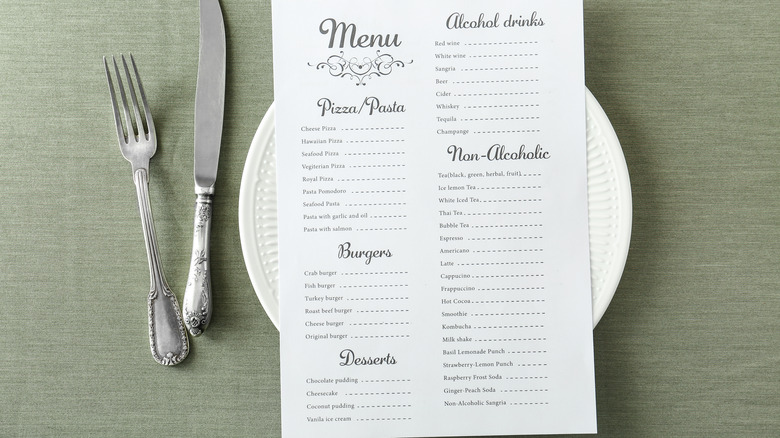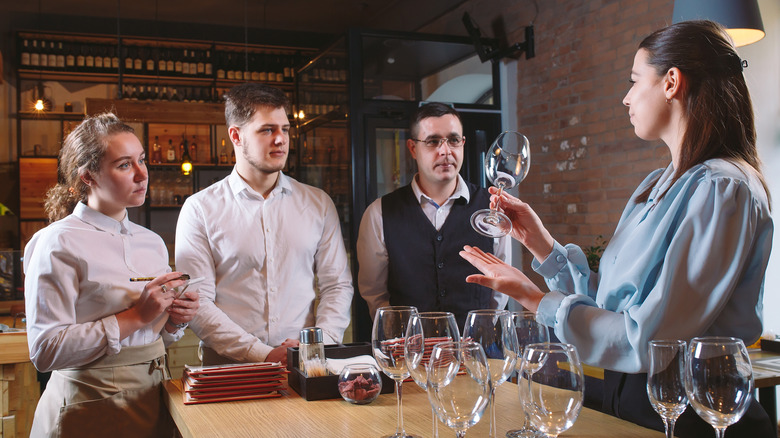What You Need To Know Before Asking A Server For Recommendations
The last time you went out to eat, did one or more items on the menu jump out at you and practically demand to be ordered? While that happens, it is the exception, not the rule. Generally speaking, most of us need some time to peruse and weigh our options before ordering. That may be even more acute when eating at a new restaurant or encountering an unfamiliar cuisine.
If the menu isn't clear or you feel analysis paralysis, you likely turn to the server for recommendations. I spent the better part of a decade working as a server, bartender, and manager in restaurants in Chicago, including a French bistro, rustic Northern Italian trattoria, and British gastropub. The throughline of all of those positions and establishments was a commitment to gracious hospitality. I was always happy to help patrons find a dish or beverage that would light up their night.
That being said, when asking a server or bartender for advice, it is important to remember that the transaction is not quite as simple as it may seem. A lot of factors affect how a server arrives at a custom recommendation that they feel will leave a patron satisfied and eager to return.
What's behind the menu?
Before we get to the interaction between server and patron, we should cover the menu, which has its own coded language meant to make recommendations to you before you're even greeted by a server or bartender. This language is commonly referred to as "menu engineering" or "menu design," and is the calculated planning restaurateurs employ to draw your eye around the menu, subtly suggesting and emphasizing items.
Next time you're in a restaurant that has a physical menu, check it out with an analytical eye. Are any items framed in a box? Those are likely dishes that the restaurant makes a decent profit margin on. Your eyes are also naturally drawn to the center and the top corners. It should come as no surprise then that savvy chefs park the dishes they want to move in those places.
Servers may have specific instructions to guide patrons toward those choices. I've had chefs explicitly direct waitstaff to recommend key items, but those instances have thankfully been few and far between. More often, chefs and managers try not to meddle with how well-trained servers interact with patrons.
Training is critical
Now, is your server working in cahoots with the menu in front of you, or are they independent and trustworthy sources of honest information? Some want to move big-ticket items and drive sales, while others will be happier moving the items they love. By and large, most servers are somewhere in between and may vary their opinion night-to-night or even table-to-table.
One thing you can count on, though, is the training your server has received. Save for the dirtiest of spoons, most restaurant owners know the value of having a well-trained staff that is knowledgeable about the menu. Take for instance the trattoria I worked at: it behooved me to know that the wild boar ragu was a slightly gamy dish whose richness was cut by a low, slow braise in Nebbiolo (an Italian red wine varietal), but that it paired well with a glass — or, better yet, a bottle — of Montepulciano.
Regardless of the restaurant, I was never given less than two weeks of training so I had time to learn the richness, saltiness, gaminess, spice level, portion size, and more about each dish. So when you request a recommendation from your server, understand that they are speaking, of course, from a place of personal opinion, but also from an intimate and expansive knowledge of what goes into each item on the menu and how it may work with your tastes and overall dining experience.
Sizing up the table
Just like every server is different, so too is every table. It is important for any server or bartender to cultivate a key sense of "reading" a table or individual patron. I'm not talking about stereotyping a group in any way, but there's nothing wrong with picking up a vibe. Things like the number of patrons at a particular table, whether they appear to be celebrating, and whether or not the people seem knowledgeable when it comes to food are all factors that influenced my recommendations.
Take, for instance, a group of seven people friends dining at a British gastropub: They want to know what's good, but of course, nothing is designed to be bad. However, some items may be better for their needs than others, like the housemade charcuterie board which is easy to share and a wonderful example of the kitchen's skill with cured meats.
For entrees, the group is all across the board: some folks want rich items, like the short rib burger, while others lean towards the mussels or vegetable korma. Since they're going out after their meal and may not want to feel stuffed, I would suggest they order a few of the more substantial entrees — such as a burger, fish and chips, and maybe the mussels — and share. Sure, my check average will be down a bit, but I know the table will ultimately be happier.
When do you take your own advice?
It's hard to say when you should ignore a server's suggestions, as any who take pride in their job will give you solid, thoughtful advice. But still, there may come times you need to discount their menu recommendations due to a difference in taste, which should be easy to suss out.
If your server has strongly suggested the tuna steak, but you're feeling more like the porterhouse, squab, or spring pea risotto, it could be they fancy fish more than you. Don't be afraid to ask if their personal tastes are guiding their picks and how they may feel about items they didn't emphatically recommend.
All in all, it's important to recognize that the server is there to assist you in having a great time. Generally, the people who get into the service industry are folks who truly enjoy food and beverage and facilitating hospitality. They will strive to understand what you like and what you need in your specific circumstance, but understand that making a recommendation is both transactional and theoretical. No one can know exactly what will satisfy you at a given moment. However, if you're forthcoming and receptive in your interaction, your server should be able to recommend a dish that delights and possibly even excites your palate.




